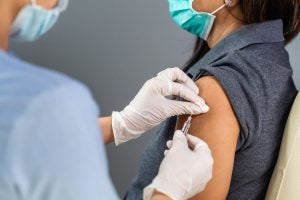As COVID-19 cases continue to rise nationwide, the Department of Homeland Security will require non-U.S. individuals seeking to enter the United States at the U.S.-Mexico and U.S.-Canada borders to be fully vaccinated for COVID-19. These new restrictions will apply to non-U.S. individuals who are traveling for both essential and non-essential reasons.
American Farm Bureau Federation President Zippy Duvall commented on the announcement the DHS would enforce these vaccine requirements at land ports of entry and ferry terminals.
“Farmers and ranchers share the goal of ensuring the health and safety of America’s families. We also have a responsibility to put food on the tables of those same families,” Duvall said. “We are extremely concerned that the Department of Homeland Security’s decision to require essential workers be vaccinated before entering the United States will limit agriculture’s ability to grow safe and nutritious food. Without a robust and stable workforce, crops could also be left rotting in the fields. …
“DHS failed to provide proper notice of the mandate, which gives farmers, ranchers, and agriculture suppliers no time to prepare. Farmworkers and truck drivers provide critical skills and have been designated as essential by the Cybersecurity and Infrastructure Security Agency. Further limiting the available workforce will exacerbate existing supply chain issues as families face rising prices and fewer options at the grocery store.”
Vaccine mandates have been politically polarizing over the past several months, particularly as the omicron variant of COVID has gained great traction.

Non-U.S. individuals traveling to the United States via land ports of entry or ferry terminals, whether for essential or non-essential reasons, must:
- verbally attest to their COVID-19 vaccination status;
- provide proof of a CDC-approved COVID-19 vaccination, as outlined on the CDC website;
- present a valid Western Hemisphere Travel Initiative (WHTI)-compliant document, such as a valid passport, Trusted Traveler Program card, or Enhanced Tribal Card; and,
- be prepared to present any other relevant documents requested by a U.S. Customs and Border Protection (CBP) officer during a border inspection.
While the vaccination requirements may sound good in theory, according to Sarah Black, general manager of Great Lakes Ag Labor Services, an ag labor agency for Michigan Farm Bureau members focused on H-2A seasonal visas, the reality of the DHS mandate is problematic on a number of fronts.
“Unlike previous COVID-related restrictions, this DHS requirement doesn’t provide exemptions for ‘essential workers’ which traditionally included guest workers utilized on our farms and throughout the food chain that help get food to your table,” said Black, noting that several farm operations in Michigan have workers scheduled to begin arriving within the next two weeks.
Additionally, the DHS mandate requires proof of a “CDC-approved COVID-19 vaccination, as outlined on the CDC website,” meaning guest workers would need either a single- or two-dose series of approved vaccines before travel.
“Unfortunately, the vaccines on the approved list are not readily available throughout Mexico, and it’s not as easy to get them because the Mexican government administers the COVID vaccinations in that country,” said Black, adding that the vaccination rate in Mexico is currently estimated to be running at 50 percent.


